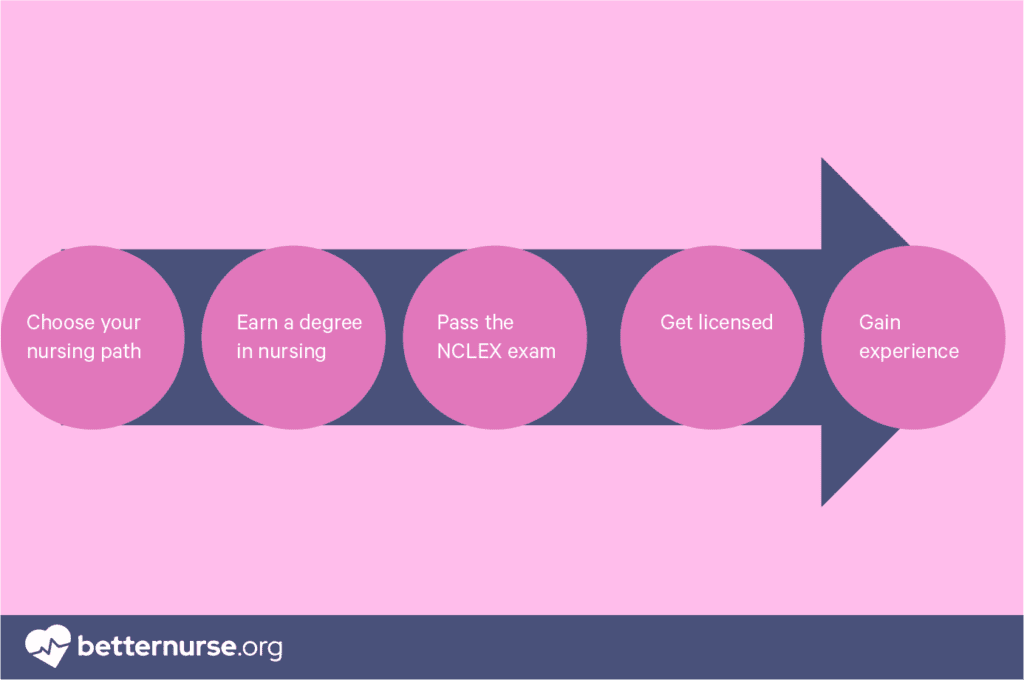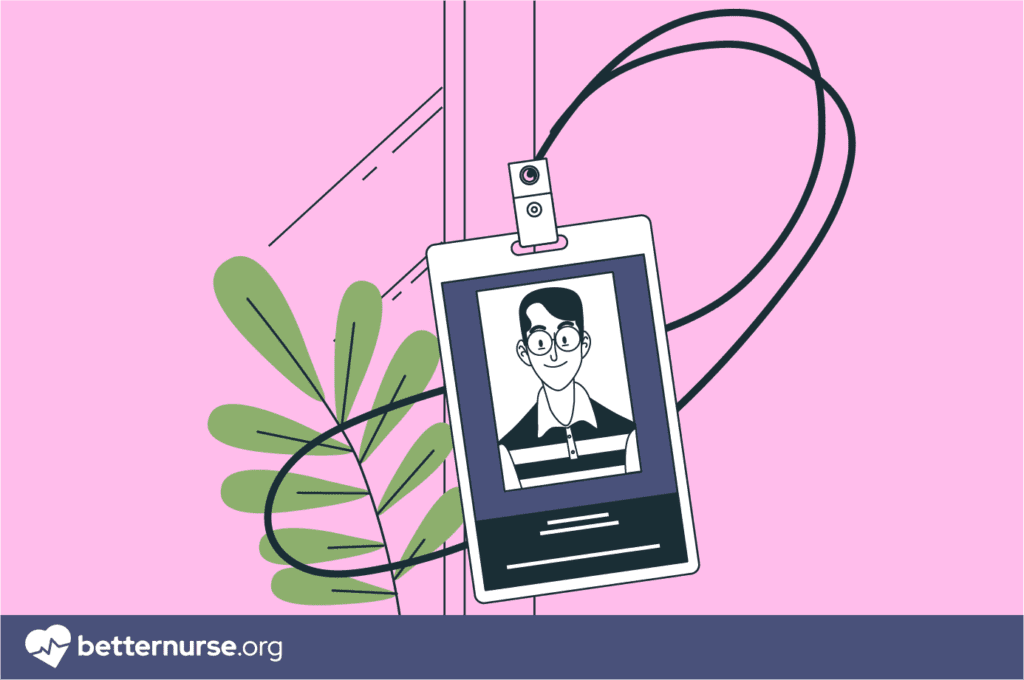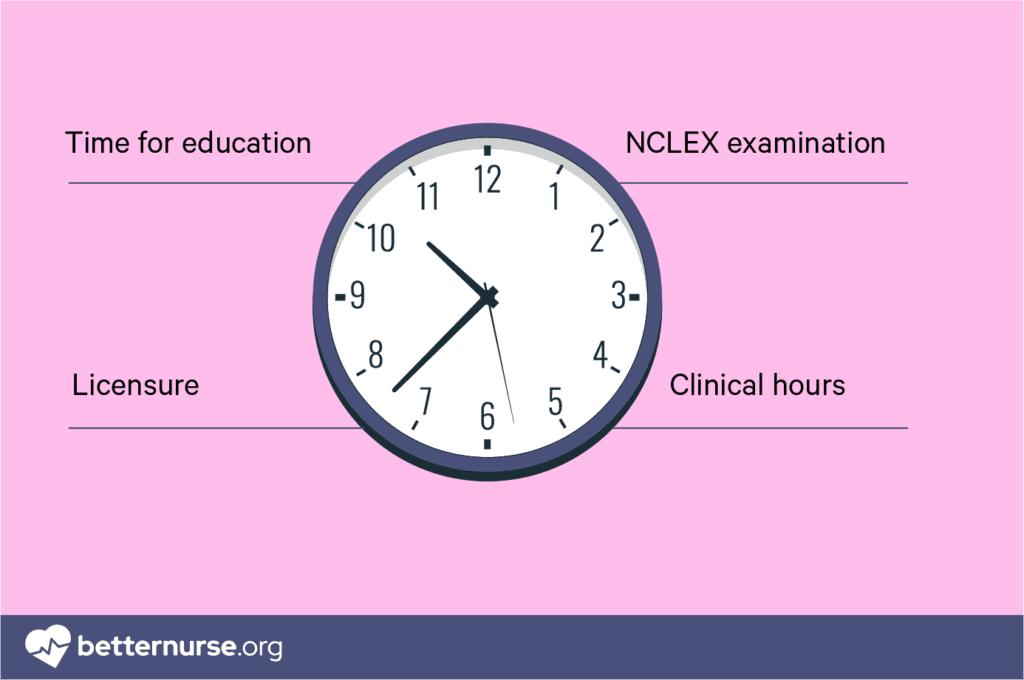To be a nurse in PA, you must obtain a nursing degree, pass the licensure exam, and obtain a nursing license from the state board.
Whether you have always been drawn to the healthcare field or are considering a career change, nursing is a choice that can lead to a fulfilling and impactful professional journey. The profession offers a unique opportunity to make a positive difference in people’s lives, providing compassionate care and support during their most vulnerable moments. Though, as a nurse, you can make a difference anywhere you go, Pennsylvania, in particular, is a state you want to consider working in. Read on as we break down each step to becoming a nurse in the so-called Keystone State.
Table of contents
Takeaway

Becoming a nurse is a lot like putting together a puzzle… Each step, from the degrees to the licensure and clinical experience, represents a puzzle piece that brings you closer to the complete picture. Certain puzzle pieces might be more challenging to find and place, but with perseverance and determination, you’ll overcome these obstacles and find the right pieces to complete the puzzle.
How To Become a Nurse in Pennsylvania

Nursing is a fulfilling career path that requires hard work and a commitment to lifelong learning. If you’re interested in pursuing this path in Pennsylvania, we can guide you through the essential steps required to become a nurse. From selecting your nursing specialty to passing the necessary exams and gaining experience, we’ll provide the information you need to embark on a successful nursing journey in the Keystone State.
Choose your nursing path
There are many different career paths in nursing, each with specific requirements and opportunities. In order to make the best choice for your future, it’s essential to take some time to explore the different types of nursing available and figure out which one best fits your interests and goals. Some of the most common nursing paths include registered nurse (RN), licensed practical nurse (LPN), and advanced practice registered nurse (APRN). By doing thorough research and understanding these paths, you can be better prepared to make an informed decision about your future career.
Earn a degree in nursing
Obtaining a nursing degree is a crucial step to becoming a nurse in Pennsylvania. Depending on what nursing path you want to follow, there are three main educational paths you can choose from:
- Diploma programs
- An Associate Degree in Nursing (ADN)
- A Bachelor of Science in Nursing (BSN) program
Diploma programs are generally acceptable to secure an entry-level position as a practical nurse. On the other hand, colleges and universities offer ADN and BSN programs to help you become a registered nurse. Still, many nursing positions now prefer applicants with a BSN degree due to its comprehensive coursework and increased career opportunities.
Pass the NCLEX exam
Once you have finished your nursing degree, the next step is to take the National Council Licensure Examination for Registered Nurses (NCLEX-RN) or Practical Nurses (NCLEX-PN), depending on your chosen nursing path. These standardized tests evaluate your knowledge and abilities required for safe and effective nursing practice. Preparing for the exam is crucial, so we suggest you study hard and take practice tests in preparation for the real thing.
Get licensed
After passing the NCLEX exam, you next want to apply for licensure from the State’s Board of Nursing. To complete the application process, you need to provide the necessary documentation along with the required fees. The board will review your application and decide whether you will receive your nursing license. This license is mandatory to practice nursing in Pennsylvania.
Gain experience
Lastly, once you have obtained your nursing license, gaining practical experience and improving your skills is crucial to advance your career. Numerous nursing positions require a specific amount of clinical experience, which you can acquire through internships, clinical rotations during your nursing program, or entry-level nursing positions.
How to Get Licensed in Pennsylvania

Pennsylvania offers two main ways to obtain a Pennsylvania RN license: an endorsement or an examination.
If you have already obtained an RN license in another jurisdiction, you can get an RN license by endorsement. In order to qualify for licensure by endorsement, you must have graduated from an approved professional nursing education program in the United States or Canada or a program deemed equivalent to the one required in Pennsylvania at completion time. Additionally, you must have obtained licensure in another jurisdiction by passing the NCLEX-RN or an equivalent examination.
On the other hand, to get an RN license through examination in Pennsylvania, you must have finished an RN nursing program approved by the nursing board of Pennsylvania, passed the NCLEX-RN exam, and fulfilled the extra requirements listed in the application form.
In addition to the two main ways to obtain a Pennsylvania RN license, Pennsylvania is one of the Compact Nursing States. The NLC is a mutual recognition model allowing nurses to have one multistate license, which permits them to practice in their homes and other NLC states without obtaining additional licenses. However, Pennsylvania enacted the NLC on July 1, 2021, but the implementation date has yet to be determined. This means the NLC rules are currently out of effect in the state.
Renewing Your License in Pennsylvania
Once you are a nurse, you must renew your Pennsylvania nursing license biennially. You will receive a renewal notice every two years before your license expires.
Keep in mind the Pennsylvania State Board of Nursing mandates that nurses complete a specific number of continuing education hours during the renewal process, which may vary based on the license type. It’s essential to stay informed about the renewal requirements and submit the required documentation before the expiration date to avoid any interruptions in your nursing practice.
What Is the Pennsylvania Board of Nursing?
The Pennsylvania Board of Nursing is the body in charge of regulating nursing practice and ensuring the public’s safety in the state. They establish criteria for nursing education programs, approve nursing programs, grant licenses, and take disciplinary action when required.
We recommend you familiarize yourself with the board’s website to access useful resources, stay updated on nursing regulations, and comprehend your duties and rights as a licensed nurse in Pennsylvania.
How Long Does It Take To Become a Nurse in Pennsylvania?

The time it takes to become a nurse in Pennsylvania depends on your chosen educational path. Diploma programs and ADN programs usually take two to three years to complete, whereas BSN programs typically take four years. However, some institutes offer accelerated programs, which can be completed in 12-18 months.
In addition to that, you’ll spend some additional months working on the NCLEX exam and licensure. The exact time it takes to fulfill all the requirements of becoming a nurse in Pennsylvania will depend on you and your work.
Salary and Job Prospects for Nurses in Pennsylvania
Registered nurses in Pennsylvania earn an average annual salary of approximately $85,870, which may vary based on their experience, location, and specialization. The exact salary can range from $61,000 to $121,000.
Moreover, there is still a high demand for nurses. According to the Bureau of Labor Statistics, the nursing employment industry is expected to grow by 6% from 2021 to 2031.
Conclusion
Pennsylvania presents a promising job market for nurses who are beginning their careers or aiming to progress to specialized roles. To enjoy Pennsylvania’s rewarding and stable employment opportunities, you must obtain a nursing degree, pass the NCLEX exam, and acquire a license from the Pennsylvania Board of Nursing. After fulfilling these requirements, you can enjoy the benefits of nursing in the Keystone State.

Nurse Luke is a CRNA who specializes in Nursing content and still enjoys a very busy career with Locum, Per Diem and Travel nursing in the greater midwest. He has over 25 years of experience in the healthcare field and received his CRNA masters degree from the Mayo Clinic School of Healthcare. He is passionate about helping nurses explore the options of becoming a travel nurse as well as spending time with his Family.



